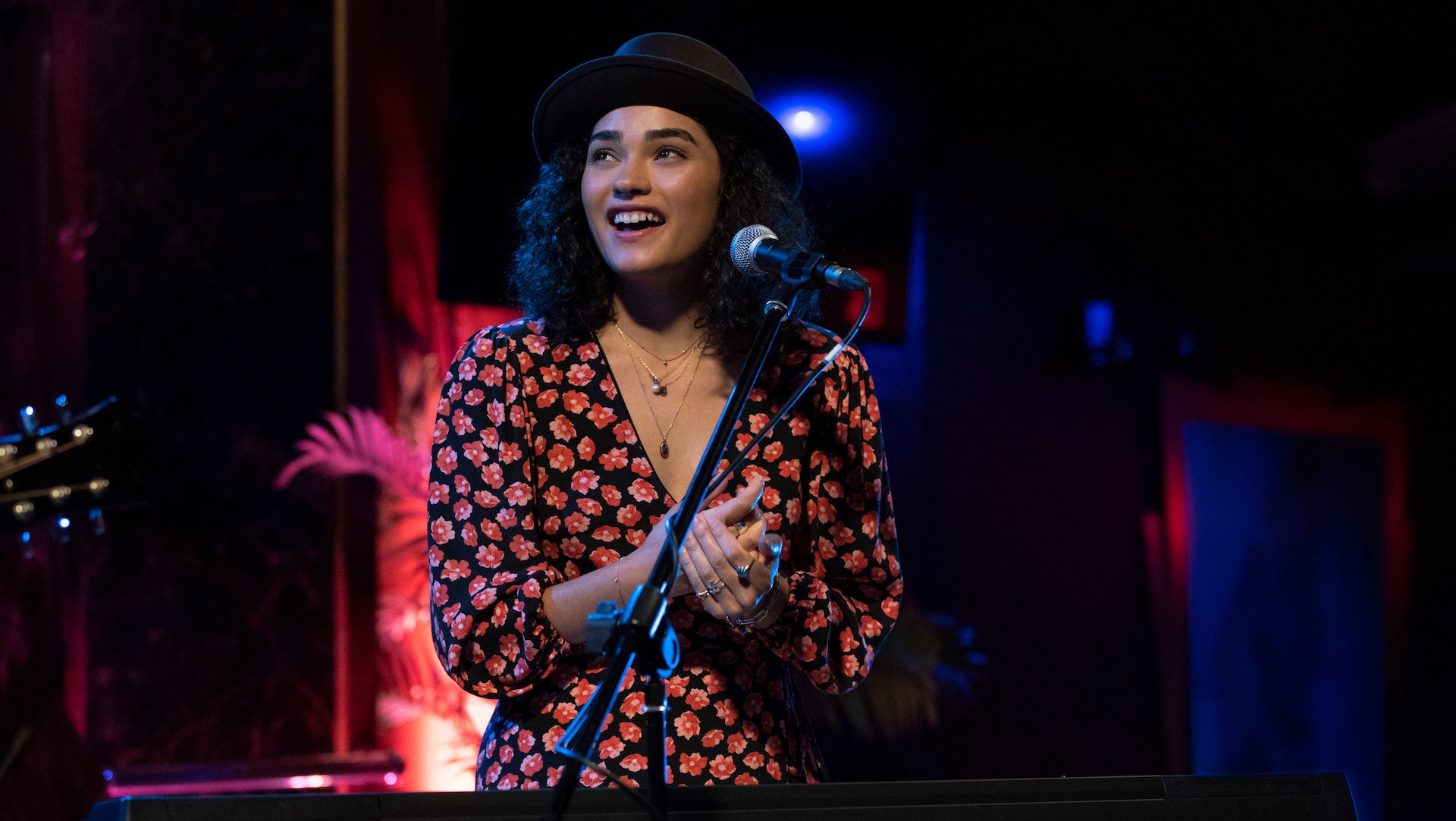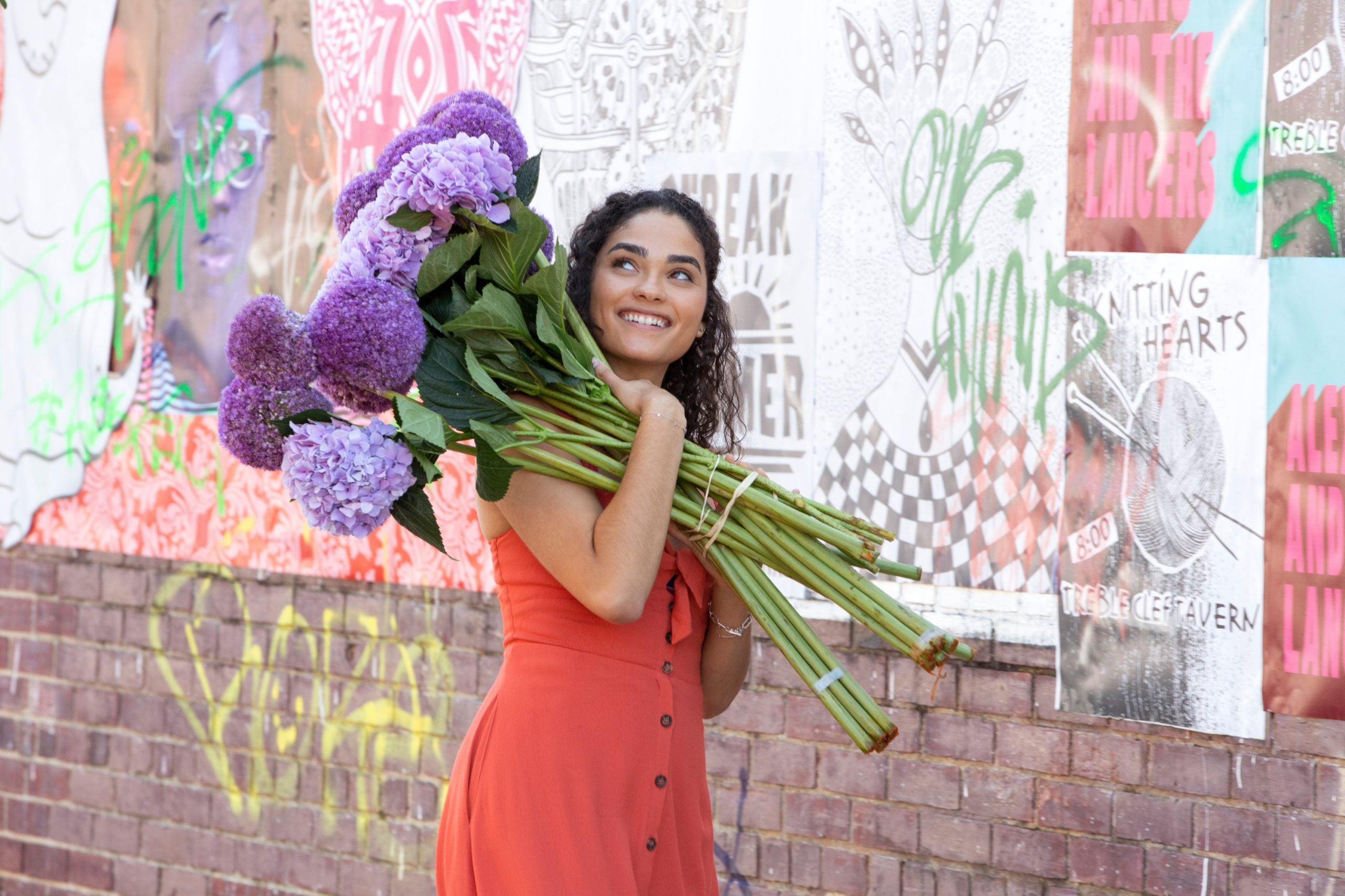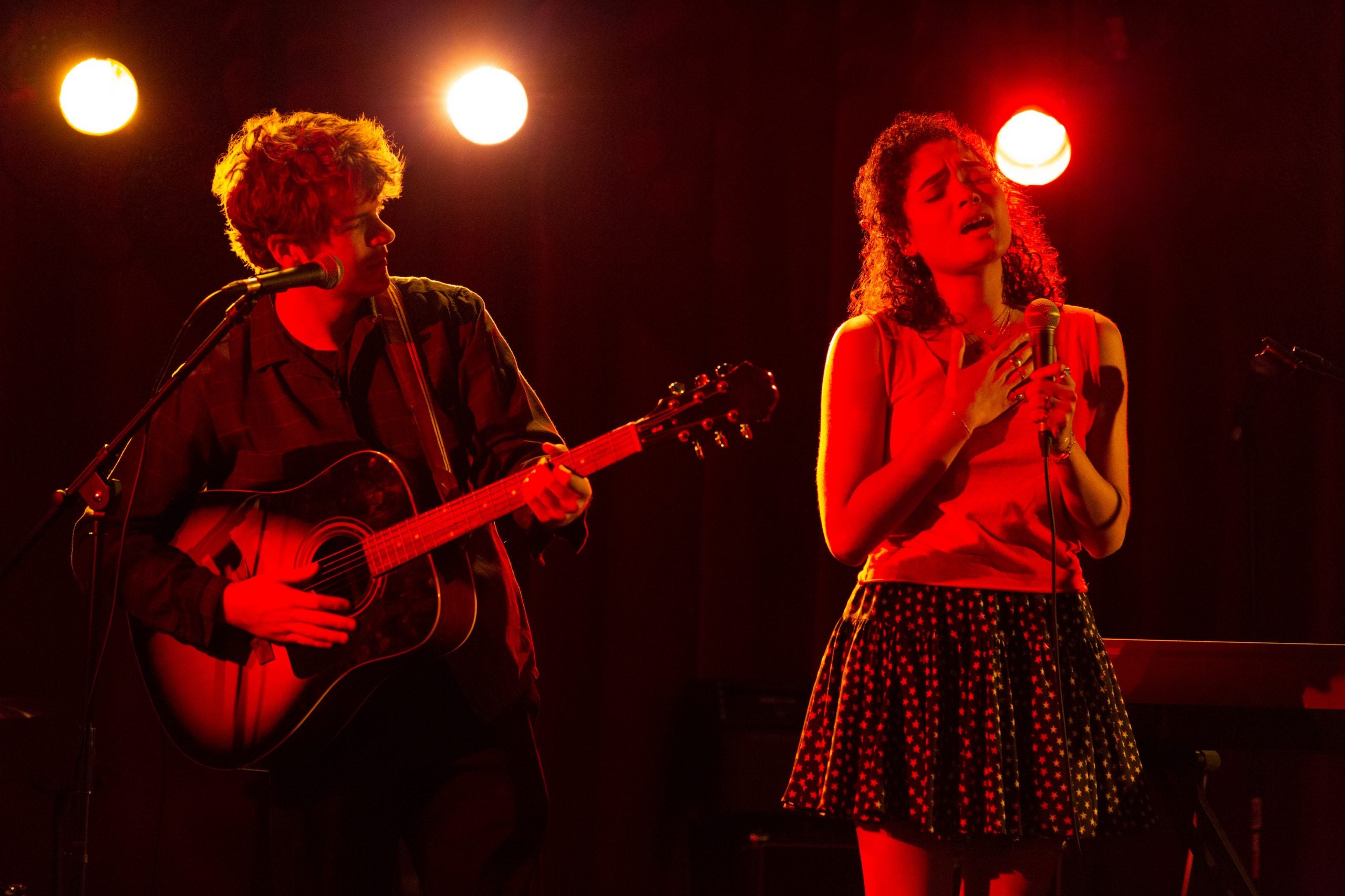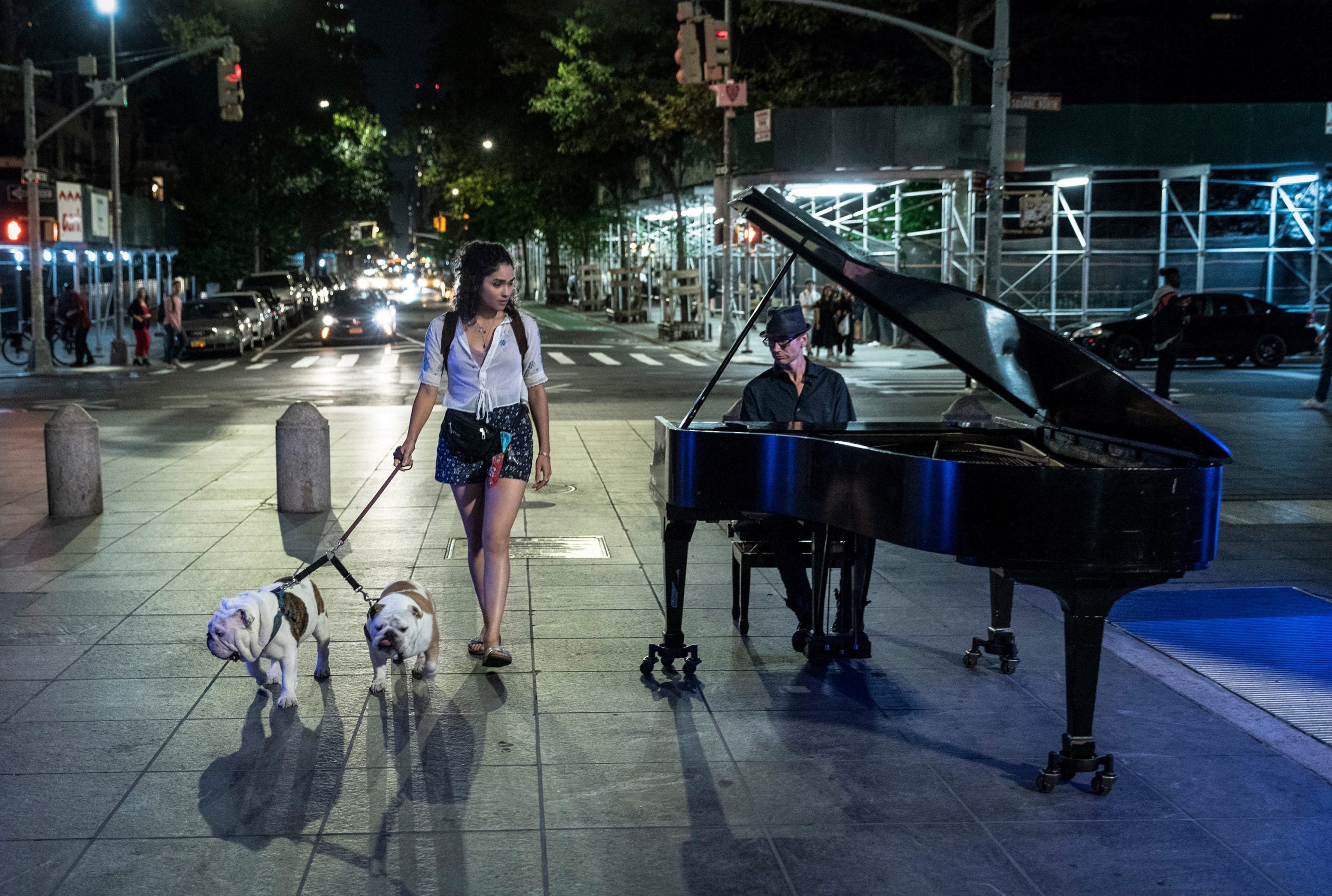
You know those television shows that keep you glued to the screen from the very minute you turn it on? The show where the lead character is so good and so charming that you find yourself rooting for someone you don’t even know?
Well, that’s exactly how Brittany O’Grady makes you feel offscreen. Her personality and smile are so infectious that it’s obvious she’s well on her way to becoming a bigger than life superstar. The budding actress, who had breakout roles in Fox’s Star and Black Christmas is finding light in a new role on Little Voice.
The Apple TV+ series (that’s available to stream right now) centers around O’Grady’s character Bess and her journey to live out her dreams as a young singer. Along the way, she encounters the challenges of taking care of her autistic brother, living in a big city and tons of boy drama. It’s a coming of age story that’ll have you reminiscing about your own once upon teenage dreams.
The 24-year-old Arlington, Virginia native caught up with ESSENCE to talk about her new show, using her platform to highlight racial injustices and why she fully believes light-skin privilege exists among Black women.
ESSENCE: So obviously, we’re living in a pandemic. It is insane times. How has it impacted your work or your life? What has changed for you during this almost six months span?
Brittany O’Grady: I feel blessed because I was able to finish Little Voice right before the pandemic hit. The show is now streaming, which is a blessing for me as an actor, but I haven’t slowed down like this before. And I felt like it was kind of necessary. I’ve just had a lot of self-reflection during this time. I’m able to spend more time with my family like right now. I’m at home.
Describe the moment that you found out you received the starring role on Little Voice. What was that like?
I was filming a horror film in New Zealand last year and…the time zones were completely different. I remember waking up at maybe 7 or 8 in the morning, New Zealand time, and getting the call from my team, like, ‘You got it.’ And I think I was so out of it because I was trying to send in tapes at 2 or 3 in the morning. It just didn’t hit me. And so, I was just kind of like, ‘OK. Let’s get to work. Let’s do it.’ I was just ready. It was like a new chapter because it was right as Star ended. So, it was like, Oh, things do go on. You can move forward. There are new chapters. I was just excited to start a new chapter.
What similarities do you see between yourself and Bess?
I think this character is the closest to myself that I’ve played. Bess is a little more outspoken and in touch with her emotions. She’s very passionate, and she’s a fighter, and she’s very dedicated to her craft, and she wants to do it her way and be authentic about it. That’s something that I feel in my work. And I think the singing style, Bess’s songs, or Sara Bareilles’s songs [since she wrote the music and executive produced the series along with J.J. Abrams], are a little more in my wheelhouse.

Fans also want to know, in real life, if you’re Team Ethan or Team Samuel? Your character Bess is stuck in this love triangle between this cute British guy, Ethan, or her fellow musician, Samuel.
Oh my God. You know, I’m going to be honest. I think we’ve all been there where we’re attracted to someone that’s just not available and can’t give you what you want or what you’re looking for to fill that void. And then the right person is kind of right there. I think the emotions and the wanting of Ethan [played by Sean Teele] are something that I can relate to and a lot of people can. And then just seeing this really like a sweet, wholesome person, that’s just kind of a rock. I really can’t pick.
While watching the show, you see how some try to discourage Bess from living her dreams. Have you ever faced discouragement in your own life and how did you overcome it?
I was really lucky. My parents are always super supportive of me. I grew up and live in the D.C. area and it’s a pretty academic place. So, [for most young people] the plan is to go to college, get a degree, do all that stuff. And I did get a lot of people kind of discouraging me from [acting]. And one time my parents [were] like, ‘Why isn’t Brittany going to college?’ I did go to college for a short period. People just didn’t believe that it was possible to have a career in the arts. Now I’m like, OK, well, all the boxes you tried to put me in just didn’t work.
Speaking of that, breaking into Hollywood for anyone is hard. As someone who has had some great roles, what advice would you give to any aspiring young actresses out there?
This sounds cliche, but just be yourself. Do not change who you are to try to fit into whatever mold people think they want to put you in. The one beautiful thing about being an actor, if someone wants to be an actor, is your unique sense of self is what changes Hollywood and what makes Hollywood better. So many people have just been their authentic selves and shaped Hollywood and also shaped viewers to be like, Oh, it’s OK to be me, or, Oh, it’s OK to be myself. I see that on the screen or I see it behind the scenes. Individuality is a scary thing, but it’s also necessary. So just stay true to yourself and stick up for yourself and others along the way, if you can.

That’s great advice. Diversity in Hollywood is a never-ending topic because the problem is never solved. What do you think needs to happen for that to change? Do you think it’ll ever change?
The root of change would have to be through the actual system of Hollywood. And I think that it has to do with having more diversity behind the scenes as well. It is just as important. We need diversity in our hair and makeup trailers. We need diversity in our writers. We need diversity in our directors, our creators, people who are creating content. That’s necessary to make a real change instead of performative change, and small steps forward, and then we just get back to the same place. I’m curious to see how things will change once we get through this pandemic and through this time where a lot of the root of racism is coming to the surface and all the systems are being challenged. I hope that they’ve changed.
You speak out a lot about racial injustices on your social media platforms. Why is it important to you to use your voice?
I went to a conservative college [Pepperdine University], and that was kind of a culture shock for me. I’ve witnessed a lot of discrimination from my peers. I experienced discrimination in college…I felt the burden and pain of racism personally. It was so overwhelming for me. And this was right before I went to Star [which premiered in 2016]. To be quite frank, I try to keep those experiences private, but I think that now it’s OK to share our experiences…It’s important to treat people with human decency. That’s so important to me as a person. Whatever group or marginalized group that you are in. And even in my experience of being a Black woman, there are privileges that I have. I see Black trans women dealing with so much discrimination, getting murdered. We all have to stick up for one another. I’ve just always felt that way and always cared about people feeling loved and heard.

I read where you talked a bit about a different types of privilege within our community where you addressed light-skin privilege. What do you say to the people who say that’s not a “thing”?
Oh, it is a thing. There are systems in our country that have been very harmful to the Black community. I’ve had experiences where people don’t know I’m Black. I don’t know what they think I am, but I’ve had experiences where I can skate by because of the way I look. And that’s something that all of us need to be aware of…It’s important to acknowledge your privilege and to hear people in their experiences if you’re not experiencing it. [Bias against darker-skinned people] is something that I’ve heard a lot from my peers, from my close friends, who are dark-skinned women, dark-skinned men. It’s very real.
Where do you hope to see yourself in 10 years?
I want to be a mom. I love children. I love my family. I hope to have careers like Barbra Streisand, Diana Ross, Lena Horne or Julie Andrews. I hope that I’m able to potentially perform at the Kennedy Center [in D.C.] for somebody, and I want to do serious films, and be able to tell different stories and explore depths of stories that I’ve never played before. I want to act until I’m like 80. I want to be wrinkly.
When people watch Little Voice, what is one message that you want them to take away from it?
I hope that they find the courage to be their authentic self and not to be afraid of failure. The one beautiful thing about this show is you witness Bess — and it’s along the lines of Sarah Bareilles’s experience as a singer/songwriter in the beginning of her career — because she was told she was too earnest in her music,or she wasn’t a proper songwriter. She wasn’t a proper singer. “Let’s have another singer to sing your songs.” There was a lot of rejection for her along the way. And I hope that people realize that when you experience rejection, I hope that it doesn’t deter you from feeling your true self and going for what you believe. I’m always afraid of failure. And I think that this character goes through so much failure, and she just kind of realizes, it doesn’t matter what other people think of me. It matters about my passion and what I do.
This interview has been edited for clarity. Little Voice is streaming on Apple TV+ right now.